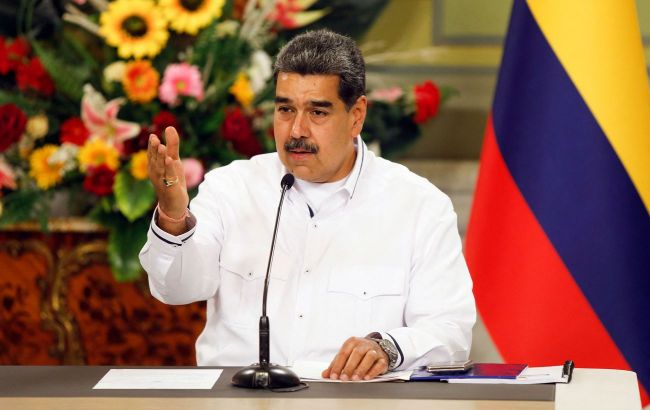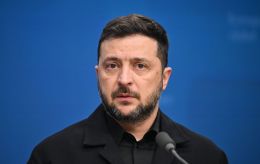Guyana and Venezuela on verge of war: Possible outcome of conflict
 Nicolas Maduro, President of Venezuela (photo: Getty Images)
Nicolas Maduro, President of Venezuela (photo: Getty Images)
A major war between Venezuela and Guyana over the Esequiba area is unlikely, as the main struggle is for the adjacent oil fields, China's interests are also evident in the region, and Ukraine is unlikely to be affected by the current conflict in South America.
Iliya Kusa, an analyst at the Ukrainian Institute for the Future, told RBC-Ukraine how the conflict between Venezuela and Guyana may develop, what role major world players will play in it, and what it means for Ukraine.
On whether a war will break out between Venezuela and Guyana
I think that everything now depends on Maduro's decision. Rationally analyzing the situation, I believe that war is unlikely.
It involves enormous risks, especially for Venezuela, which Maduro cannot bear. Even if he manages to seize this territory, although there is nothing to seize, it is very difficult to pass through, almost no one lives there.
So I think it's most likely that it will end online. Maduro will declare a great victory, that they have resolved a historic dispute in their favor, and mobilize the electorate on this theme before next year's elections, which he promised the United States to hold as a result of agreements with the opposition a few months ago.
Firstly, the territory itself is sparsely populated, and secondly, the border is very conditional, meaning that it is difficult to guard because it is a rugged jungle, it is a very difficult area, and there is no transport infrastructure at all, there are several dirt roads that connect several settlements, such as villages, which are inhabited mainly by indigenous peoples, tribes that are more related to Venezuela.
And, generally speaking, effective control of this territory is a very abstract thing, i.e., I don't see any significant sense in going in with large armies.
It seems to me that the whole point of what Maduro is doing, if we put aside any subjective factors, is to mobilize the electorate before next year's elections and, perhaps, put pressure on the United States and Guyana to get the opportunity to develop oil fields on the disputed shelf. This is a more realistic goal.
About the interests of major global players
The global situation can also be explained by the economic interests of China, which controls many large infrastructure facilities, from Suriname to Guyana to Venezuela. It is interested in having friendly countries economically participate in this chain, where they are building a transportation corridor that will consolidate their influence for years to come.
Since Venezuela has legally decided that the Esequiba territory is part of them, it is their territory, so they have a claim to the shelf, which contains the oil field that was found in the last 10 years.
I think they will claim it based on this fact, saying that we have decided for ourselves that this is also our territory, so let us participate in the distribution of these fields.
I think this is how it will be explained. As for China's interests, they do exist. I am not sure how much China coordinates with Venezuela. In recent years, they have played both sides in this region. On the one hand, they support Venezuela, and on the other hand, Chinese companies, together with American companies, have been actively involved in exploring these fields off the coast of Guyana. So, in general, I cannot say that China will openly support only one side.
Unlike the United States, which is clearly on the side of Guyana, it is not a matter of importance to China who exercises effective control over these territories.
But, of course, if Venezuela strengthens its position in the region as a result of, for example, such a symbolic victory in a territorial dispute, it will be more beneficial for China, because Venezuela is a more reliable ideological ally that is anti-American.
As for the Russian factor, I think it is present, of course, in the sense that the Russians would probably persuade Maduro to escalate to armed clashes. Because, from the point of view of Russian foreign policy, the more crises there are, even small crises in our world that the United States is forced to be distracted by, the more pressure there will be on the United States around the world, and this, in their view, will incline the West to negotiate over Ukraine.
Therefore, I believe that the Russians will definitely support Maduro's actions related to increasing the degree of escalation in the regions bordering Guyana. That is, I do not rule out armed clashes on the border or some sporadic incidents related to such clashes.
A large-scale war is still unlikely, I think, but incidents like this, where Maduro will say that he was attacked by the Guyanese and he defended himself heroically, are quite possible. Especially as we get closer to the election date. And I think that Russia will be on the side of Venezuela in this context, of course.
On the impact on Ukraine
Of course, everything can always be explained by the fact that any event distracts from Ukraine. I think this is a very poor response, because not everything revolves around our situation, and we cannot proceed from this. It's clear that any global event diverts attention from another to some extent, but this is not an answer. I believe that this does not always have a practical impact on our positions.
For example, the war between Israel and Hamas, even though it has pushed our war into the background in the media, has had hardly any impact on our situation, so we cannot say that, for example, our positions have changed significantly because of the war between Israel and Hamas. Everything remained the same as before, the problems that existed with military aid to Ukraine in the United States were there before the war and, in general, remained the same, and continue to be related to the same internal problems in the United States that existed before.
I think even in the event of a war between Venezuela and Guyana, it will be exactly the same. That is, nothing will change significantly. Yes, the United States will be forced to respond to that crisis, but not at the expense of military or financial assistance to Ukraine. This is a separate issue that now depends more on the U.S. domestic political agenda than on Venezuela and the situation in Latin America.

